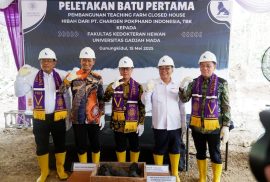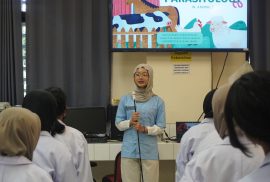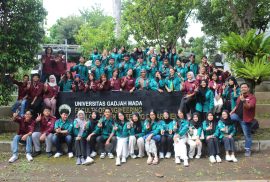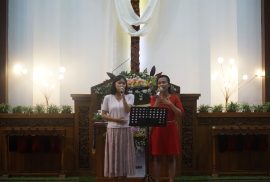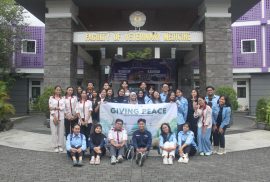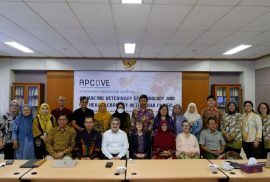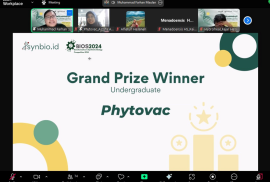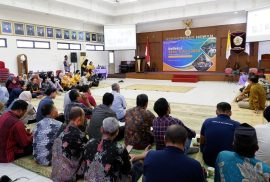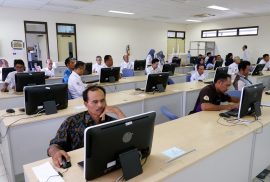FoVM UGM is the first university to receive a Grant for the Modern Closed House Layer from PT. Charoen Pokphand Indonesia
Faculty of Veterinary Medicine
On Sunday, May 4, 2025, the Productive Animal Husbandry Study Association (HSTP) of the Faculty of Veterinary Medicine, Universitas Gadjah Mada, successfully held the “HSTP Bergerak” event with the theme “Vet Camp: A Day in the Life of a Veterinarian, Veterinarian in Action.” This event was attended by 84 participants from various high schools in Yogyakarta and surrounding areas.
On Saturday, May 3, 2025, a Study Visit to Faculty of Engineering UGM was held at the Department of Geological Engineering UGM by the Veterinary Science Club (VSC) Network Department of Faculty of Veterinary Medicine UGM together with American Association of Petroleum Geologists (AAPG) FT UGM. The Study Visit itself is an annual work program carried out to expand the relationship of VSC members not only within the scope of the faculty but also throughout UGM area.
“Easter Special” Dog Run is a collaborative activity between the Pet Study Group (KSHK) of the Faculty of Veterinary Medicine, Universitas Gadjah Mada and the Dog Run Community located in Yogyakarta.
The Easter Worship and Celebration is an annual event held at Universitas Gadjah Mada. In 2025, the Christian Student Fellowship (PMK) of the Faculty of Veterinary Medicine (FVM) UGM also organized its own Easter Worship and Celebration. This event took place on April 26, 2025 from 04.00 to 07.40 PM at GKJ Samirono Baru.
Peace is a situation that needs to be fought for and celebrated together. Based on this belief, the faculty’s religious Students’ Unit Activity (UKM) (PMK – Christian Students Fellowship, KMK – Catholic Students Family, and KMMV – Muslim Students Family) organized a Social Charity
The Faculty of Veterinary Medicine (FKH), Universitas Gadjah Mada (UGM), is collaborating with the University of Sydney, Australia, as the lead institution in the Strengthening Veterinary Workforce in Asia-Pacific for Diseases Detection and Response (Vet-APIDDaR) project, funded by the Australian Department of Foreign Affairs and Trade (DFAT).
The 2024 International Genetically Engineered Machine (iGEM) competition team of Universitas Gadjah Mada (UGM) under Olimpiade Nasional Matematika dan Ilmu Pengetahuan Alam (ONMIPA) community of UGM won 5 awards in the 2024 national Bioinformatics and Synthetic Biology (BIOS) competition by Synbio.id.
Dean of the Faculty of Veterinary Medicine, Prof. drh. Teguh Budipitojo, M.P., Ph.D in his speech expressed his appreciation for the hard work of the entire Faculty of Veterinary Medicine UGM community. “This year, through TCK (Performance Achievement Targets), we succeeded in achieving a number of targets set by the university,” he said. The targets that have been achieved by FVM UGM include study program accreditation, number of citations held by FVM UGM lecturers, international collaboration, and community service (SDGs 16: Peace, Justice and Strong Institutions, SDGs 17: Partnerships for the Goals).
However, the faculty also faces a number of challenges, such as improvements in academic and student affairs services, all indicators in TCK can be exceeded, and increased creative funding in work units such as Prof. Soeparwi Animal Hospital and Smart Veterinary Teaching Farm (SVTF). The Year End Reflection activity was also entertained by musical performances by Faculty of Veterinary Medicine UGM lecturers and staff and ended with lunch together (SDGs 2: No Hunger, SDGs 10: Reducing Inequalities, SDGs 17: Partnerships to Achieve Goals).
Apart from that, during the training, the participants also took part in the Kahoot game to refresh the participants’ concentration so that they did not get sleepy while getting the material. One of the participants, Ika Fitri Puspitasari, said that this training was useful for making daily work easier. The material is easy to understand and put into practice to complete the work. One of the materials, namely creating and distributing certificates via Autocart, is very useful for making work more efficient. Another participant, Kartika Wulansari, also stated that this training provided new insights that were very useful. Especially in making certificates and managing documents using the internet, it is very helpful in supporting our performance as employees. This is also supported by interactive presenters both in providing material online and offline so that interactive two-way communication can be established. “I hope that training activities like this can continue to be held so that our performance as employees can be effective,” she said (SDG 9: Industry, Innovation, and Infrastructure).

